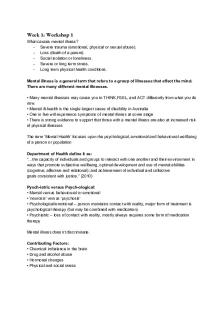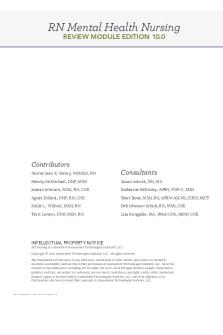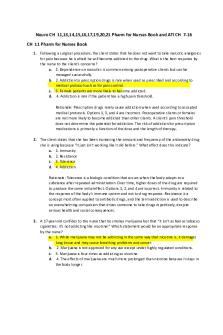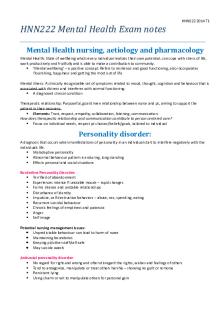Bipolar Disorders - lecture notes - Psychiatric Mental Health Nursing PDF

| Title | Bipolar Disorders - lecture notes - Psychiatric Mental Health Nursing |
|---|---|
| Course | Mental Health Nursing |
| Institution | University of Arizona |
| Pages | 5 |
| File Size | 98.4 KB |
| File Type | |
| Total Downloads | 59 |
| Total Views | 129 |
Summary
lecture notes...
Description
Topic 5 Bipolar Disorders Bipolar Disorder I (Severe)
Manic episodes that last at least 7 days Symptoms that are so severe that require immediate hospital care
Bipolar Disorder II
Pattern of depressive episodes and hypomanic episodes, but not the full-blown manic episodes in bipolar I
Cyclothymic Disorder (Chronic)
Numerous periods of hypomanic symptoms as well as dysthymic (low-grade depression) symptoms lasting for at least 2 years (1 year in children and adolescents)
Bipolar I & II are more common in creative persons and those who are highly educated Substance abuse is NOT considered a cause of bipolar disorder, but it can worsen it by interfering with recovery o May induce a more severe depressive phase Genetic predisposition to sleep-wake cycle problems that may trigger symptoms of depression and mania Antidepressants can trigger manic episode o Use of anti-manic drug (creates a ceiling for mood elevation, protecting the patient from antidepressant-induced mania)
Manic = fast; Depressive = Slow Hypomania Mania Delirious mania Dysphoric mania = higher risk for suicide Phases of Mania Treatment Acute phase
Medical stabilization Maintaining safety Self-care needs o Structure in a safe milieu o Nutrition o Sleep o Hygiene o Elimination
Continuation phase
Maintaining medication adherence Psychoeducational teaching Referrals
Maintenance phase
Preventing relapse
Psychopharmacology for Bipolar Disorders
For mood stabilization o Lithium First-line agent for bipolar disorder Do NOT limit sodium while taking lithium Monitor for dehydration Do NOT take diuretics with lithium Can result in o Renal damage, hypothyroidism Therapeutic range: 0.6-1.2 Kidney function exams TSH, T3, T4 Lithium Toxicity NARROW THERAPEUTIC INDEX (high risk for toxicity) >1.5 = toxic; >2 severe toxicity Mild toxicity: muscle weakness, muscle twitching & ataxia, confusion, slurred speech, GI effects, thirst, polyuria Advanced toxicity: significant coarse hand tremor, persistent GI upset, ataxia & clonic movements, incoordination, EEG changes Severe toxicity: Ataxia & clonic movements, blurred vision, large output of dilute urine, seizures, tinnitus, stupor, severe hypotension, coma >2.5: client decline due to cardiac dysrhythmias, peripheral circulatory collapse, proteinuria, oliguria, and death may occur (due to pulmonary complications) Treatment for lithium toxicity: o Stop lithium administration o Hydrate o Supportive measures o Certain anticonvulsants Divalproex (Depakote) Effective for lithium non-responders Black box warning: hepatotoxicity, pancreatitis, and teratogenicity May cause birth defects, polycystic ovarian syndrome Symptoms of toxicity
Ataxia, confusion, coma, hallucinations, irritability, somnolence Lamotrigine Notorious for severe skin reaction called stevens-Johnson syndrome Start at very small dose and follow a titration regimen to increase to a dose that provides good symptom control Report ANY sign of rash to their provider immediately to be assessed for stevens-Johnson syndrome o Certain atypical antipsychotics Olanzapine Second-generation atypical antipsychotic Aripiprazole For episodes of acute mania o Certain benzodiazepines used in emergent situations, primarily acute mania (short term use only) Lorazepam Clonazepam ALPRAZOLAM SHOULD NOT BE USED FOR ACUTE MANIA INCREASED AGITATION AND AGGRESSION o Certain atypical antipsychotics (used to supplement lithium during acute mania) lower the physical activity present during acute mania during the several weeks it will take the lithium to become fully effective Olanzapine Risperidone Aripiprazole Ziprasidone For episodes of mixed mania o Certain antipsychotics
Childhood impulse control disorders Oppositional Defiant Disorder (ODD)
Pattern of angry/irritable mood, argumentative/defiant behavior lasting at east 6 months as evidenced by at least 4 symptoms from any of the following categories o Often loses temper o Easily annoyed o Angry o Argumentative with authority figures o Defies or refuses to follow rules o Annoyance o Vindictive?
Conduct Disorder (CD) – doesn’t care for anyone or anything
Repetitive and persistent pattern of behavior in which the basic rights of others or major age-appropriate societal norms or rules are violated: (antisocial behaviors) destruction of property, steal, and even hurt pets Childhood-onset (before age 10)
Physically aggressive (to people and/or animals) Poor peer relationships Shows little concern for others Lacks guilt and remorse More likely to continue into adulthood
Adolescent-onset (10-18)
Less aggressive form of CD Acts out misconduct with peer group Less likely to continue into adulthood
Treatment for Childhood Impulse Control Disorders
Parenting classes and management training necessary to help parents deal with these disorders, including limit setting Individual and parent management training (family therapy)
Impulse Control Disorders (kleptomania)
Decreased ability to resist an impulse to perform certain acts o Tension builds until a particular action is taken which releases the tension Similar to OCD, however there isn’t an associated obsession They realize that the acts are illogically wrong, but despite their efforts, the urge to act overwhelms them Shame and distress accumulating from the unacceptable behaviors increases the risk of developing depression and of committing suicide
Psychopharmacology for Impulse Control Disorders
Kleptomania o SSRIs o Bupropion o Naltrexone Conduct Disorders o Lithium o Methylphenidate o Risperidone Nonpharmacologic treatments o Hypnotherapy o CBT Focus: habit reversal & sensitization to consequences
o o o
Biofeedback Behavioral conditioning Group psychotherapy...
Similar Free PDFs

Mental Health Newsletter-Bipolar
- 3 Pages

Uworld Mental Health Nursing
- 168 Pages

Nursing and Mental Health 1 Notes
- 62 Pages

ebook for mental health nursing
- 219 Pages

ATI TEST - mental health nursing
- 38 Pages
Popular Institutions
- Tinajero National High School - Annex
- Politeknik Caltex Riau
- Yokohama City University
- SGT University
- University of Al-Qadisiyah
- Divine Word College of Vigan
- Techniek College Rotterdam
- Universidade de Santiago
- Universiti Teknologi MARA Cawangan Johor Kampus Pasir Gudang
- Poltekkes Kemenkes Yogyakarta
- Baguio City National High School
- Colegio san marcos
- preparatoria uno
- Centro de Bachillerato Tecnológico Industrial y de Servicios No. 107
- Dalian Maritime University
- Quang Trung Secondary School
- Colegio Tecnológico en Informática
- Corporación Regional de Educación Superior
- Grupo CEDVA
- Dar Al Uloom University
- Centro de Estudios Preuniversitarios de la Universidad Nacional de Ingeniería
- 上智大学
- Aakash International School, Nuna Majara
- San Felipe Neri Catholic School
- Kang Chiao International School - New Taipei City
- Misamis Occidental National High School
- Institución Educativa Escuela Normal Juan Ladrilleros
- Kolehiyo ng Pantukan
- Batanes State College
- Instituto Continental
- Sekolah Menengah Kejuruan Kesehatan Kaltara (Tarakan)
- Colegio de La Inmaculada Concepcion - Cebu










